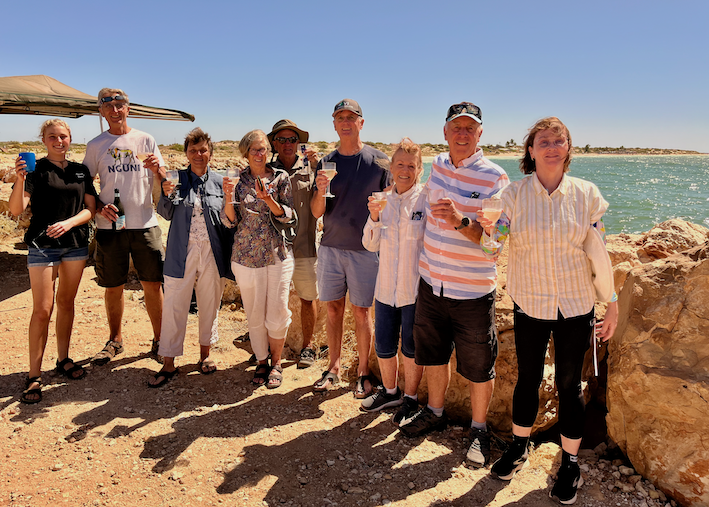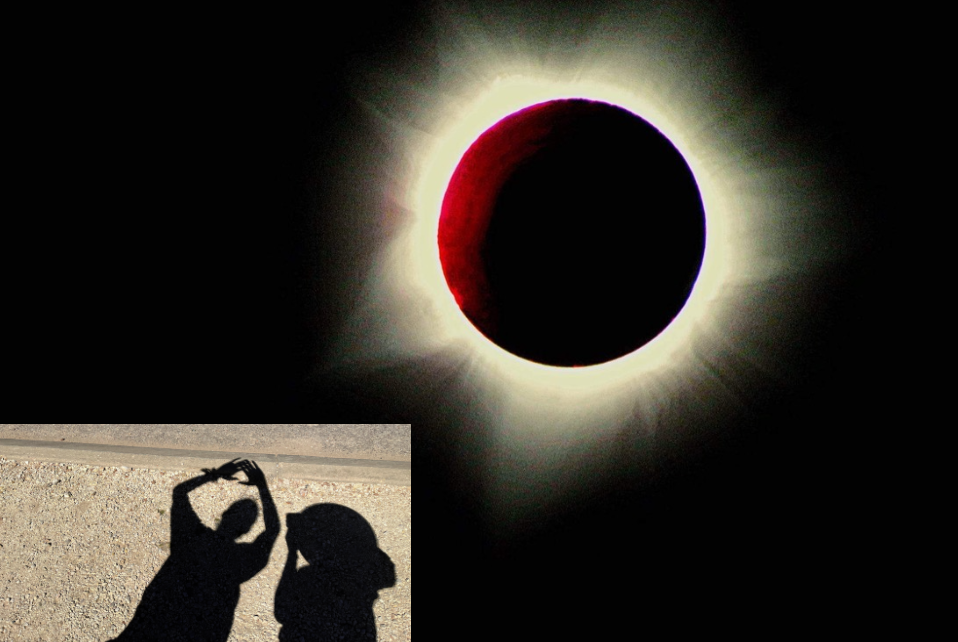Kryss Katsiavriades and Talaat Qureshi are from North London and while they have travelled to every continent and seen some extraordinary places, they have never camped before in their seventy-something years on planet Earth.
Sleeping on a caravan mattress in a sweltering, dusty campsite in a remote part of Western Australia is not an experience they intend to repeat. But they journeyed more than 15,000 km and booked the only accommodation they could find to witness the brief total solar eclipse which brought fame to the remote seaside town of Exmouth on Thursday, 20 April 2023.
Usually home to around 3,000 residents, Exmouth is a dot on the tip of the North West Cape on the Exmouth Gulf where crunchy beach sand meets red dirt in breathtaking beauty. On this morning, 15,000 or so visitors like Kryss and Talaat have temporarily swelled the population of the town to observe a celestial phenomenon rarely seen by humans but often mentioned in our myths and stories: when brightest day transforms into darkness.
Kryss, a retired data analyst, is wearing a white T-shirt with a solar eclipse image emblazoned on the front. The back of his shirt is devoted to a list of the 19 total eclipses he has seen, beginning in Java in 1983, to countries including Mexico in 1991, Zimbabwe in 2001, Siberia in 2008, China in 2011 and Chile, in 1994 and 2019, and concluding with the present event in Exmouth, Australia.
I find the couple setting up for the eclipse in the early morning on Exmouth’s newly spruced-up Town Beach, with freshly planted green lawn, shaded barbecues and a row of catering vans laid on for visitors. The easterly wind is gusting over the Indian Ocean and the brilliant blue sky is perfectly cloudless. Kryss is happy to talk to me, provided I do not get in his way, as he perfects his photographic set-up for the rare astronomical spectacle – with totality to start at 11.29 am.
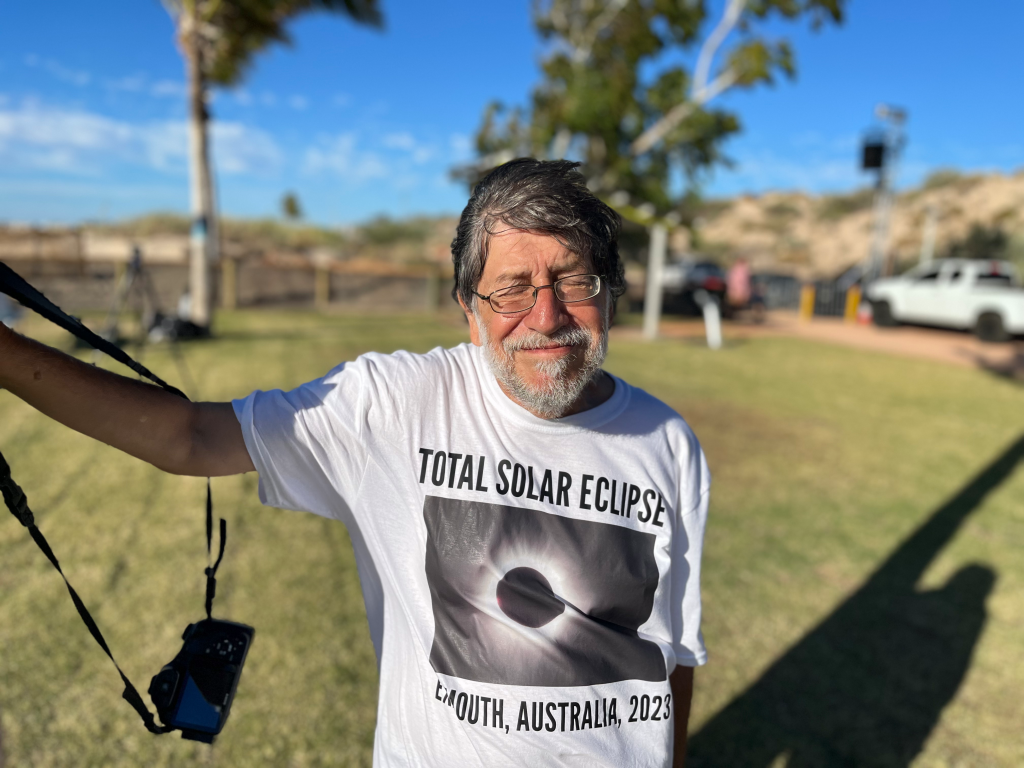
A total solar eclipse happens when the moon passes between Earth and the sun, blocking all direct sunlight, as day descends into darkness. The path of totality is a long, narrow strip and only a tiny part of the Earth is touched by this other-worldly shadow which occurs every 18 months or so. The 2023 total eclipse will reveal itself here on the North West Cape, and also in Timor-Leste and Indonesia.
At Exmouth, totality will last just short of one minute but those 54 seconds – when the sea changes colour and the seabirds quieten as the moon drops perfectly in front of the sun – are magical. The sunny morning gradually dims as the moon begins its descent from high in the sky to begin covering the sun.
Ahead of the eclipse, Kryss gives the same advice as all the experts: to view the sun as the moon’s shadow begins moving into place, you need special solar eclipse glasses to protect your eyes.
“But at the moment when totality starts you can safely look at the sun,” says Kryss, pointing to the image on his chest depicting a blazing sun covered by the entire disc of the moon.
“During totality, the moon covers the sun. You see two planets, Jupiter and Venus. You start to get the sky changing colour, sometimes the sea changes colour, the light from the sun is more golden. When totality comes, it gets dark in about 10 seconds, it’s not like twilight. And then you see the corona and if the sun is very active as it has been recently, you will see red flames on the edges, the prominences.”
And so it is at the moment of totality. I see turquoise waves change to purplish black, the air cools as if night has fallen, the wind stills, and Jupiter and Venus greet us in the mid-morning sky. I remove my flimsy eye protection and observe the sun now quite black with a vivid glow around its mighty circumference.

We, the assembled sky watchers, whoop and cheer at this marvel, and the birds cease wheeling over the ocean. This is the time to feel the exquisite, overwhelming power of the natural world.
For Talaat, total solar eclipses can indeed feel scary, and she has seen a few, 12 to be precise.
“It feels like a giant is walking across the landscape and it gets cold as well. The hair stands up on the back of your neck and the birds behave differently,” she told me before the eclipse began.
The trip to Exmouth for this perfect time is well worth the effort for the English visitors. On Kryss’s meticulously maintained website, he later describes it thus: “Two planets and a beautiful, eclipsed sun with a very bright and colourful corona. Three years of planning and a drive of 1,673 km [from Perth] had been worth it.”
Kryss and Talaat had joined people from all over the world for this spectacular event, and they came from places as far away as Cornwall and Cape Town, Munich and Manhattan, and almost everywhere in between.
The precise number of visitors who descended on this remote peninsula on the Ningaloo Coast is difficult to pinpoint – an outlandish media prediction of 50,000 was out by 30 to 40,000. But for the people who made it, international visitors, Australians from across the vast continent and Exmouth locals, it was, as the eclipse chasers had predicted, an unforgettable experience.
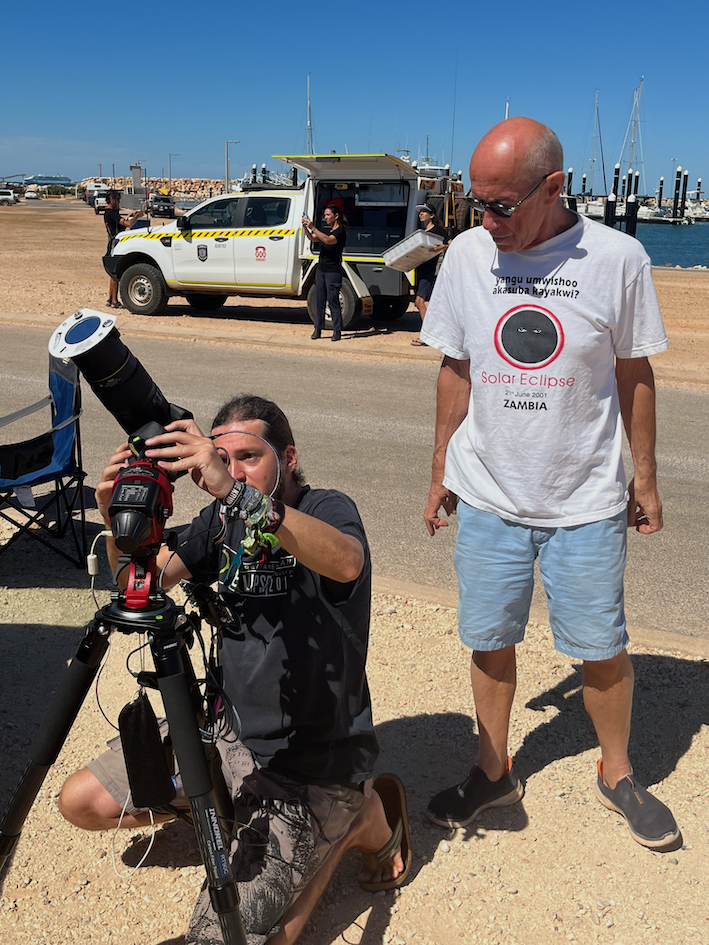
Werner Varnhorn and his friend Andreas Moeller are from Kassel, Germany. They had set up their cameras on the Exmouth Marina, alongside 20 or so other vehicles, a few hundred metres from Exmouth Town Beach.
Werner has witnessed six total eclipses in his life, Andreas five and counting. Andreas tells me when the next total solar eclipse will take place: April 8, 2024, and he has already booked his flight to see this one in Mexico.
“You could also travel to Texas or Canada for the next eclipse, but the weather will be better in Mexico,” says Andreas, who describes for me the beauty of shadow bands during a solar eclipse.
“Usually, shadows are not sharp. During an eclipse, the light becomes like lazers. Two minutes before totality, you see very sharp shadows and shadow bands on the ground. You can see the atmosphere moving two minutes before and after totality.”
I try to grasp his explanation, and I take photographs of my shadow before the eclipse starts and then after the total eclipse ends. When I look back at the photos on my phone, I can see my windblown hair poking out in all directions like a haystack, as if drawn with a sharp, black pen.
Grant Salmond is also on the marina, and he has travelled here from Winton, Queensland. He saw his first total solar eclipse in 2012 near Cairns and became bewitched by the beauty of eclipses.
He spent an even more uncomfortable few nights than Kryss and Talaat – not in one of the local caravan parks – but in accommodation provided by the Exmouth Shire Council described on its website as the “Welch Street Overflow campsite”. Scrubby bushland cleared to cater for extra visitors, the campground is a red dustbowl dotted with self-sufficient campers and eager volunteers in fluoro green shirts. Grant was prepared to withstand these baking, sandy conditions to capture his solar eclipse photographs and be part of this remarkable event.
“I was always into astronomy. I was living in Mt Isa in 2012 and was close enough to see the eclipse near Cairns in Queensland. This is my fourth eclipse, the second in Australia.” He says it won’t be his last and generously promises to share one of his photos with me after the eclipse.
Compared with the many professional and semi-professional astrophotographers, Grant is equipped with a standard off-the-shelf camera and filter and laments that he had to leave his telescope behind for his solo trip.
On the marina, the most relaxed people I speak to are Robyn and Steve, Exmouth locals of 25 years standing. Their knowledge of eclipse events is scant, but they arrive in good time in their 4×4 ute – the standard vehicle in all Western Australian fishing and mining towns.
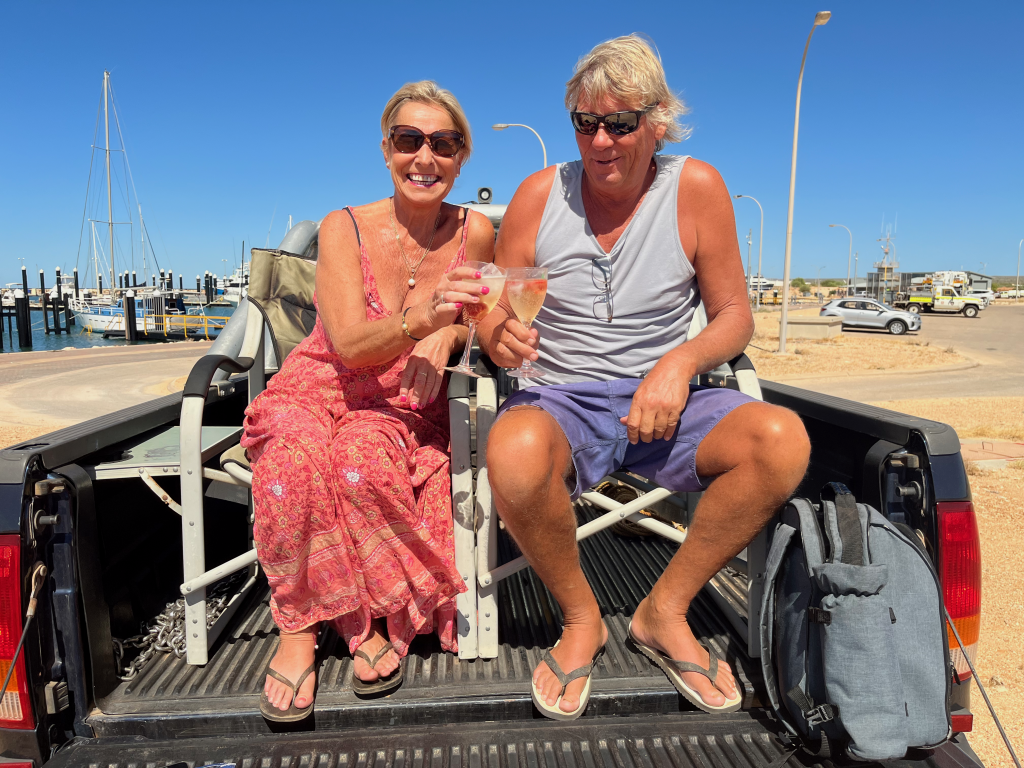
They place camping chairs in the tray of their ute and Robyn fills two flutes with sparkling wine and strawberries. With eclipse glasses at their sides, they await the encounter with their first total solar eclipse. They don’t know what to expect, but they are as excited as any of the people on the dock, including professional photographers with formidable cameras and lenses, free campers with their dogs, townspeople with their picnics – enthusiastic eclipse chasers, all.
Robyn and Steve, bronzed as the golden eclipse sunlight, are welcoming and happy to chat. They love their hometown which they have seen transform over the decades – from a fishing and diving outpost established by the now departed US Navy in 1964 – to a popular holiday destination, with the World Heritage Ningaloo Reef and Cape Range National Park attracting more and more tourists every year.
Christine and her daughter Stefani are from Perth, and their view of the total eclipse is from Exmouth Town Beach where they have spent the week operating a coffee cart which the family drove up from Perth for the event. For the past few days, I’ve enjoyed their coffee and service – their iced lattes are as good as any a city-slick barista could serve up. While Christine is putting on a brave face, she admits the lack of customers all week has been disappointing. The last straw, she says, was when a fourth coffee van appeared on the day of the eclipse, with no notice given to the other vendors. Communication by the organisers, she says, was poor.
The Exmouth eclipse planners – led by the Western Australian government – went to great lengths to make the eclipse a success for a modest seaside town that struggles at the best of times to cope with extra holiday visitors and limited accommodation and water. A special Dark Sky Festival included an astrophotography exhibition, free concerts and an Indigenous festival that covered the shires of Exmouth, Ashburton and Carnarvon.
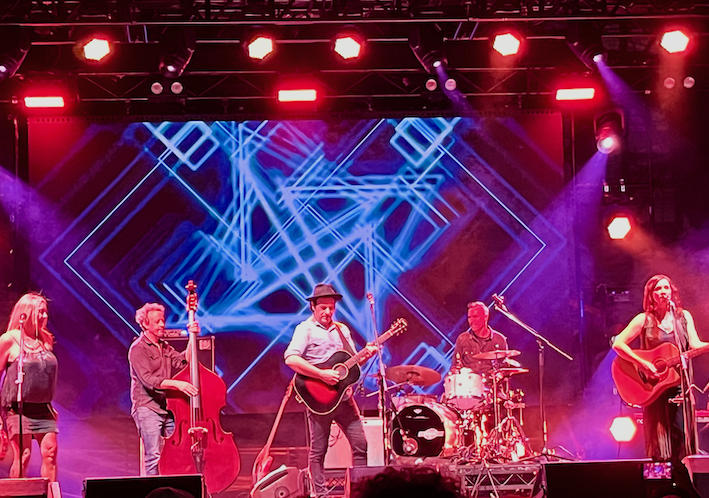
The tension between people worried about a free-for-all where too many “outsiders” would overwhelm the pristine Ningaloo Coast and others who thought it an opportunity to put the region on the tourism map was evident in Exmouth. One of the event co-ordinators who had long toiled behind the scenes said a few locals had made the planning of the occassion hard going. The chatter on the local Solar Eclipse Facebook page reflected a variety of opinions, but in truth, no one knew quite what to expect.
The officials in charge were taking no chances, and so roadblocks were placed at the entrance of the nearby Cape Range National Park where drivers were stopped and only allowed to proceed if they had a booking at one of the limited campsites in the park. On the day of the eclipse, cars were stopped from driving towards Town Beach, with shuttle buses provided to the hundreds who made their way to the shore.
In the end, there was room enough for everyone who was drawn to the magic of the Exmouth solar eclipse. For a visitor like me, travelling with a group of family and friends who had planned our visit for more than a year – from Perth, Brisbane, Johannesburg and Wellington – we were simply grateful to be present.
The total solar eclipse was so brief and beautiful – it reminded me of life itself. We toil and struggle and argue incessantly. Now and again, we might get a moment to consider our tiny place in the Universe with appreciation. The Exmouth eclipse was such a moment.
Top feature photo: Nathan Paterson
